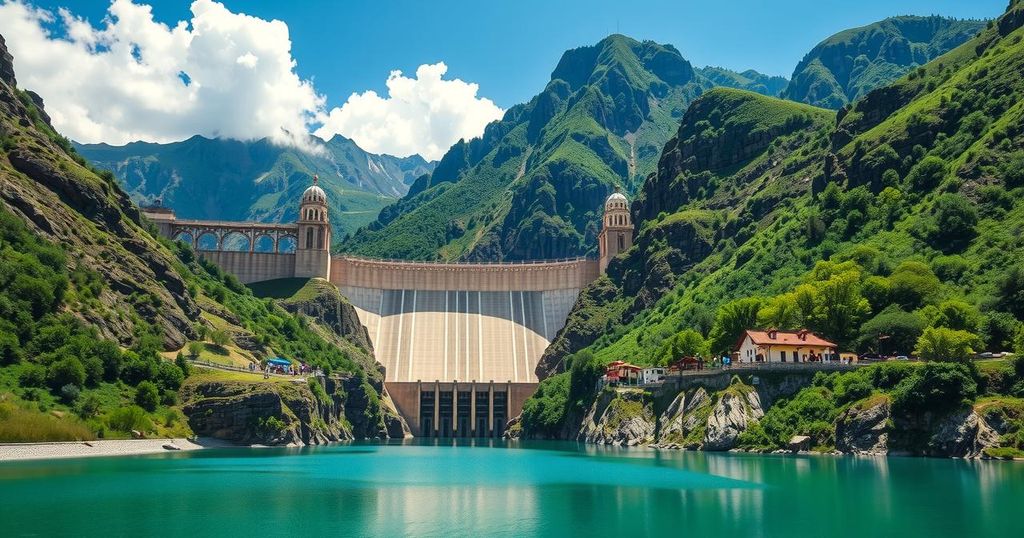Ecuador is preparing to take control of the Coca Codo Sinclair dam from Sinohydro after prolonged arbitration regarding construction defects. The dam currently supplies 20-30 percent of Ecuador’s electricity, despite operational issues. A decisive ICC ruling expected soon will influence future energy cooperation and investments. Ecuador’s proactive response exemplifies the capacity of host nations to enforce accountability in international projects.
The Coca Codo Sinclair hydroelectric project, a significant infrastructure endeavor financed and constructed by China, has faced notable controversies since its inauguration in 2016. As Ecuadorian authorities prepare to take over the dam, they are currently engaged in negotiations with Sinohydro Corporation, the project’s contractor. This situation reflects the role of Ecuador as a proactive participant in resolving issues linked to foreign-funded projects.
Coca Codo Sinclair contributes approximately 20-30 percent to Ecuador’s daily electricity consumption. Notably, the project has been operational for eight years without an official handover due to ongoing arbitration at the International Court of Commerce (ICC) regarding defect issues in its infrastructure. The focus of the arbitration centers on micro-fissures found in the power distribution pipes, which the Ecuadorian government has contested, alongside other construction flaws.
Repair attempts over the past decade have failed to resolve the persistent pipe fissures. Furthermore, the sediment removal system at the dam has proven inadequate, requiring repetitive dredging stoppages in the reservoir. Due to these defects, there is increasing public pressure on Ecuador’s government to ensure accountability from Sinohydro prior to any official acceptance of the project.
An ICC decision regarding the arbitration is anticipated by the end of March, which will yield binding results. The conclusion of the legal dispute is crucial, as it will facilitate the official transfer of Coca Codo Sinclair to the Ecuadorian state electricity company. Both Ecuadorian and Chinese officials express eagerness for this lengthy process to conclude, particularly following last year’s energy crisis prompted by a significant drought, which underscored the country’s reliance on hydropower for approximately 70 percent of its electricity needs.
Ecuador seeks to initiate new energy generation projects to avert future shortages, with a focus on securing financing for renewable initiatives, potentially from Chinese official development sources. However, the conclusion of the Coca Codo Sinclair project is essential for future financing arrangements with entities like the Export-Import Bank of China. Thus, stable resolution of the defects associated with this dam has become a priority for Ecuador.
Sinohydro aims to finalize the project after years of unexpected obligations and resource allocation. The company’s reputation is at stake, particularly given the challenges related to corruption and infrastructure failures. Furthermore, discussions around the potential concession of Coca Codo’s operations to Sinohydro or a private firm post-handover remain vibrant, which could mitigate Ecuador’s risks linked to sediment and erosion.
As the conclusion of the Coca Codo Sinclair dispute approaches, the implications for Ecuador are considerable. The arbitration’s outcomes may significantly affect future energy investments and the reliability of Ecuador’s electricity supply. Moreover, Ecuador is poised to assert its authority over foreign-financed megaprojects, showcasing its commitment to ensuring accountability and sustainable development within such partnerships. The resolution of this case will serve as a critical example of the negotiation power held by host countries in the context of international infrastructure projects.
In summary, the Coca Codo Sinclair dam represents a significant case involving Ecuador’s assertiveness in managing foreign investments and ensuring accountability in Chinese-funded projects. As the International Court of Commerce moves toward a decision regarding the arbitration, the results will impact both Ecuador’s future energy strategies and Sinohydro’s reputation. Furthermore, Ecuador’s proactive role highlights the importance of host country agency in shaping the outcomes of international infrastructure initiatives, stressing the need for accountability and sustainability in development practices.
Original Source: chinaglobalsouth.com






